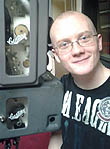|
|
 
|
|
Author
|
Topic: Laser Beams "Zap" Theater Cell-Phone Users
|
Jim Cassedy
Phenomenal Film Handler

Posts: 1661
From: San Francisco, CA
Registered: Dec 2006
|
 posted 03-17-2016 10:12 AM
posted 03-17-2016 10:12 AM




A New Weapon for Battling Cellphones in Theaters: Laser Beams
Story Linky
BEIJING — Audience members using cellphones bedevil performers and
presenters around the world. But in China, theaters and other venues have
adopted what they say is an effective — others might say disturbing — solution.
Zap them with a laser beam.
The approach varies, but the idea is the same. During a performance,
ushers equipped with laser pointers are stationed above, or on the perimeter
of, the audience. When they spot a lighted mobile phone, instead of dashing
over to the offender, they pounce with a pointer (usually red or green), aiming
it at the glowing screen until the user desists.
Call it laser shaming.
“It’s usually only a small fraction of the audience that we have to deal
with,” said Wang Chen, an employee in the theater affairs department
at the Shanghai Grand Theater. “They can’t help themselves. So we try
to give them a gentle reminder, so they know what they’re doing.”
Xu Chun, 27, who was in the audience for “Carmen” at the National
Center for the Performing Arts in Beijing last month, said: “Of course
it’s distracting. But seeing lighted-up screens is even more distracting.”
For the uninitiated, the appearance of a blazing colored beam in a
darkened theater can be jarring.
“I remember the first time I saw the lasers, it was shocking to see
that little red dot in the middle of a performance,” said Joanna C. Lee,
a consultant for American symphony orchestras touring China. “Like
someone was pointing a gun at the audience.”
Indeed, the narrow shaft of bright light can connote danger. Laser sights
are a popular feature on firearms, and there have been numerous incidents
in which lasers aimed at cockpits have impaired pilots’ ability to fly safely.
(There are more benign uses for a laser pointer, of course, like making
presentations and playing with cats.)
But laser pointers have been used for years as disciplinary devices at
many of China’s leading performance halls, including the National
Center, the Shanghai Oriental Art Center and the Shanghai Grand Theater.
This may be a response to a particularly acute problem here. Audience
numbers have surged in recent years, along with the number of new
performance spaces. And theatergoers are often noticeably younger
than in the United States and Europe, with a corresponding lack of
experience with Western-style concert etiquette. The lasers, theater
managers say, are part of a larger effort to teach audiences how to
behave during live performances.
Are the performers bothered by the use of lasers?
“No, it’s very smart, very fast, very effective,” Giuseppina Piunti,
an Italian mezzo soprano, said backstage last month after singing the
title role in “Carmen” at the National Center. “They should use the lasers
all over the world. I can see the lasers from the stage, but it’s much less
distracting than the flash cameras, and the ushers running up and down
the aisles.”
The key, said Yang Hongjie, deputy director of the theater affairs
department at the National Center, is to make ample use of the pointers
early in a performance so that offenders (as well as nearby patrons) know
what to expect should they dare to sneak a photo.
<END>
> As a side note, several years ago, one of my friends brought me a
"camera phone disrupter" from Hong Kong, It looks similar to the IR
panel used by hearing-impared devices, however, what it does is emit
extremely bright, but invisible to the eye, flashes of IR light. Since the
imaging chips in most electronic cameras and phones can 'see' into the
IR light range, it totally 'confuses' the auto exposure mechanism, causing
the picture (still or video) to come out unusable.
I've 'played' around with it at home, but never tried it in a theater.
I've never measured the pulse frequency to see if it would interfere with
IR hearing devices. Maybe one of these days.......
| IP: Logged
|
|
|
|
|
|
|
|
|
|
|
|
|
|
|
|
Marcel Birgelen
Film God
Posts: 3357
From: Maastricht, Limburg, Netherlands
Registered: Feb 2012
|
 posted 03-17-2016 06:30 PM
posted 03-17-2016 06:30 PM




quote: Mike Blakesley
While the idea is great, it looks like a lawsuit waiting to happen. All it would take is one person getting the laser reflected back into their eyes, getting "zapped" and suddenly developing blurred vision, severe headaches, mental stress, inability to concentrate at work, and several other things a good lawyer could drum up.
Yeah, although It's not like any of those low powered lasers could do any more harm than a bright flashlight could do, but mention a certain buzzword on their "evil list" like "laser" or "nuclear" and people tend to go into frenzy mode, although nothing really ever happened.
quote: Louis Bornwasser
Just build a Faraday cage around the auditorium.
Has been discussed before. Building a Faraday cage around any decently sized auditorium that actually works for this purpose is close to impossible.
quote: Frank Cox
I don't have very much of an issue with cell phones here at all, probably because I'm consistent and always on top of it right away.
It obviously also depends a lot on your audience. While I agree that a no-tolerance policy is key in combating this problem, it's not always as easy to enforce, especially if you're running a multiplex with the bare minimum level of staffing.
| IP: Logged
|
|
|
|
|
|
|
|
All times are Central (GMT -6:00)
|
|
Powered by Infopop Corporation
UBB.classicTM
6.3.1.2
The Film-Tech Forums are designed for various members related to the cinema industry to express their opinions, viewpoints and testimonials on various products, services and events based upon speculation, personal knowledge and factual information through use, therefore all views represented here allow no liability upon the publishers of this web site and the owners of said views assume no liability for any ill will resulting from these postings. The posts made here are for educational as well as entertainment purposes and as such anyone viewing this portion of the website must accept these views as statements of the author of that opinion
and agrees to release the authors from any and all liability.
|

 Home
Home
 Products
Products
 Store
Store
 Forum
Forum
 Warehouse
Warehouse
 Contact Us
Contact Us




 Printer-friendly view of this topic
Printer-friendly view of this topic









![[Eek!]](eek.gif)




